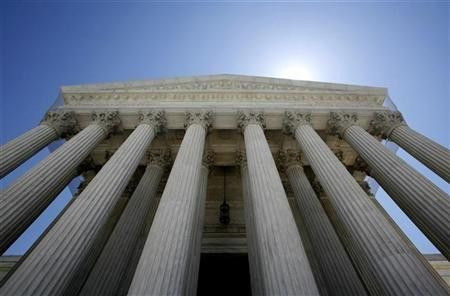Same-Sex Marriage: Don?t Expect Supreme Court To Jump Into Case Anytime Soon
OPINION

Jamie Chandler is a professor of political science at Hunter College in New York City.
A federal appeals court has declined to reconsider striking down California's prohibition on same-sex marriage, leading some to suspect that the issue will reach the Supreme Court.
Same-sex marriage isn’t headed to the Supreme Court anytime soon.
Conventional wisdom says that Tuesday’s Federal Appeals Court ruling refusing to revisit the legality of California’s Proposition 8 ban will bring the case to the Supreme Court next year. But don’t expect SCOTUS to jump in anytime soon; the question of whether gay marriage is legal or heralding the destruction of civilization, is not yet an issue ripe for the court’s final word. If history is any judge, the Justices will reject any request for certiorari until a sufficient and long-term discourse has taken place in society.
Social conservatives want the case to be heard as soon as possible. Conservatives believe that the ideological balance of the bench swings in their favor. Catholic Chief Justice John Roberts, and Justices Antonio Scalia and Sam Alito support the integrity of the outcome of ballot referendums. Scalia has been particularly vociferous in his opposition to gay rights. He wrote in his 2003 Lawrence vs. Texas dissent, a case that found Texas’s anti-sodomy laws unconstitutional, that the court had signed onto a gay agenda directed at eliminating the “moral opprobrium that has traditionally attached to homosexual conduct.”
Gay rights activists cite public opinion and the American value of equality as cause. Since President Barack Obama’s half-hearted support for gay marriage -- he said he personally supports it but defers resolution to the states -- public opposition is at a record low.
Not to mention, “Don’t Ask Don’t Tell” is no longer public policy, and a number lawsuits are now circulating through the courts challenging the Defense of Marriage Act. But these developments are not enough to put Proposition 8 on SCOTUS’ 2012-2013 docket. Only five states now legalize same-sex marriage, with a majority of others having constitutional amendments preventing the same.
Past history shows that the court waits until a new right is sufficiently defined and legal in a majority of states. The outcome of the 1972 Roe vs. Wade case, although a continuing rallying cause for Evangelicals, was expected. Most states provided legal recognition for the medical procedure, so the court’s 7-to-2 ruling met little opposition. The last few states making abortion illegal were brought in line with the consensus.
The Right to Privacy, which grounded their decision and their 1965 Griswold vs. Connecticut ruling concerning the legality of the sale of birth control, followed a similar path. Samuel Warren and Louis Brandeis first proposed the idea of privacy in an 1890 Harvard Law Review article. But it took more than 70 years of case law to hammer out what this meant constitutionally.
The court almost always puts the protection of its credibility first. There have been several controversial cases in the past that nearly wrecked its legitimacy. The 1857 Dred Scott vs. Sanford ruling that explicitly stated slaves were property and had no right to sue and the 1818 Hammer vs. Dagenhart ruling that allowed the legality of child labor brought significant public backlash and weakened their influence for several years.
Both sides want to put same-sex marriage to bed now, but the wizards of the bench will not grant their wish anytime soon. Expect their magic wands to be stowed in their desks for at least another decade.
© Copyright IBTimes 2025. All rights reserved.





















